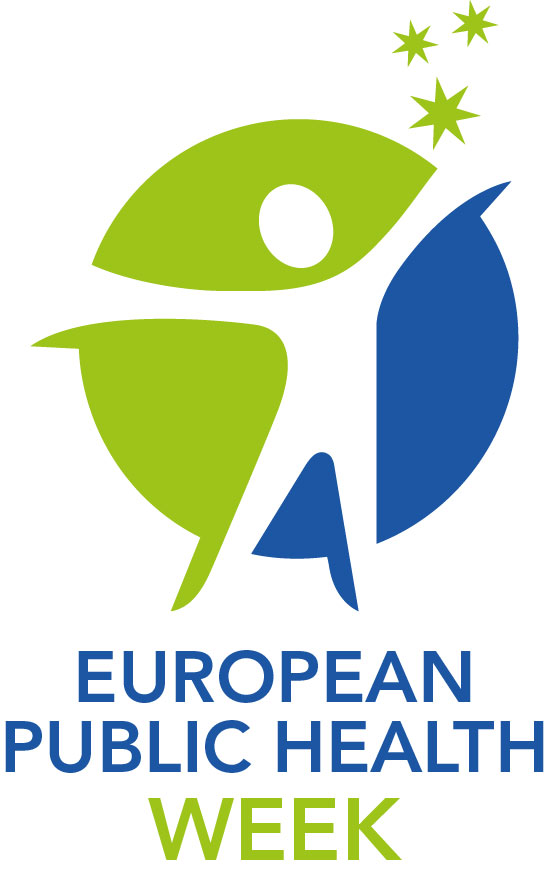 |
The European Public Health Association Newsletter - July 2022 |
|
Newsletter - July 2022 |
1. EditorialWelcome to the July issue of our newsletter with updates on what is going on in public health in Europe and beyond. We hope you have enjoyed/are enjoying your well-deserved summer break and are looking forward to restart your work feeling refreshed and healthy. Wishing you pleasant reading, Iveta Nagyova, EUPHA president and Dineke Zeegers Paget, EUPHA strategic advisor |
2. EUPHA update
Mark your calendar: European Public Health Week - 23-26 May 2023!Mark your calendars for this week, which aims to:
Looking forward to working with you next year! https://eupha.org/EUPHWEUPHA participates in new EHDS pilot projectEUPHA is proud to be one of the partners in the European Health Data Space (EHDS) pilot project, which was selected for funding by the European Commission last week. The creation of an EHDS is one of the key components of a strong European Health Union. The EHDS aims to promote better access and exchange of different types of health data for research and policy purposes, which is essential for achieving our vision: to enable everyone in Europe to achieve the highest possible level of health by providing independent and authoritative analysis of the evidence, combined with targeted advocacy to achieve coordinated action by all key stakeholders.
EUPHA's response to the European Commission's consultation on the European Health Data Space actIn July, EUPHA replied to the European Commission's consultation on the European Health Data Space act with the support of the EUPHA Public health monitoring and reporting section. EUPHA welcomes the establishment of the EHDS, and feels that the regulation proposal provides a solid basis for further discussion and development. In that further development, we urge to Commission to take into consideration various issues that, when not considered well and mitigated, could hamper the practical implementation and effectiveness of the EHDS. https://eupha.org/repository/EHDS%20act%... |
3. European Public Health Conference15TH EUROPEAN PUBLIC HEALTH CONFERENCE, 9 - 12 NOVEMBER 2022 - STRENGTHENING HEALTH SYSTEMS: IMPROVING POPULATION HEALTH AND BEING PREPARED FOR THE UNEXPECTED.PLENARY PROGRAMME Opening session: Strengthening health systems in Europe, Thursday 10 November, 11:40 – 12:40 CET. Moderators: Reinhard Busse, Chair of EPH Conference 2022, Verena Vogt, Chair of the International Scientific Committee. Speakers: Hans Kluge, WHO Regional Director for Europe, Stella Kyriakides, EU Commissioner for Health and Food Safety [tbc], Karl Lauterbach, Minister of Health, Germany [tbc] Plenary 1: Can people afford to pay for health care? Evidence on inequity in financial protection in Europe. Organisers: WHO Regional Office for Europe, Thursday 10 November, 14:50 – 15:50 CET Moderator: Natasha Azzopardi Muscat, WHO Regional Office for Europe. Speaker: Charles Normand, Trinity College Dublin, Ireland. Panellists: Sarah Thomson, WHO Regional Office for Europe, Kaisa Immonen, European Patients' Forum (EPF). More speakers to follow. Plenary 2: Benefits and challenges of the European Health Data Space. Organisers: EUPHA, European Commission, Thursday 10 November, 17:40 – 18:40 CET Moderators: Iveta Nagyova, EUPHA, Isabel de la Mata, European Commission. Speakers: Andrzej Rys, European Commission, Petronille Bogaert, Sciensano, Belgium, Irene Schlünder, TMF, Germany, Emmanuel Bacry, Health Data Hub, France Plenary 3: Health Systems Performance Assessment for Policy: Uses and Abuses / Measuring health system performance: using data to improve population health. Organisers: European Observatory on Health Systems and Policies, European Commission, Friday 11 November, 10:30 – 11:30 CET Moderators: Dimitra Panteli, Observatory, Isabel de la Mata, European Commission Speakers/Panellists: Reinhard Busse, Technical University Berlin, Germany, Irini Papanicolas, London School of Economics, United Kingdom, Jon Cylus, Observatory. More speakers to follow. Plenary 4: Reorienting health services: the transformational potential of health promotion. Organiser: EuroHealthNet, Friday 11 November, 14:00 – 15:00 CET Moderators: Martin Dietrich, Caroline Costongs, EuroHealthNet. Speakers: Rüdiger Krech, World Health Organization, Susan Michie, University College London, United Kingdom, Jan De Maeseneer, Chair European Commission Expert Panel on Effective Ways of Investing in Health, Jet Bussemaker, Council of Public Health & Society, Netherlands, Cristiano Figueiredo, NOVA University Lisbon, Portugal Plenary 5: Sustaining high quality care: interprofessional training for our clinical and public health workforce. Organisers: ASPHER, EHMA, Saturday 12 November, 10:30-11:30 CET Moderators: John Middleton, ASPHER. Speakers: Natasha Azzopardi Muscat, WHO Regional Office for Europe, George Valiotis, EHMA, Fatai Ogunlayi, UK Public Health Specialty Registrar. More speakers to follow. Closing Ceremony of the 15th European Public Health Conference. Saturday 12 November, 15:00 – 15:45 CET Moderators: Reinhard Busse, Chair of EPH Conference 2022, Verena Vogt, Chair of the International Scientific Committee. Speakers: Christian Drosten, Institute of Virology, Charité Universitätsmedizin Berlin, Germany, Dineke Zeegers Paget, Past Executive Director EUPHA Anthony Staines, Chair of the 16th EPH Conference 2023 LUNCH SYMPOSIUMS We are organising an exciting lunch symposiums programme during the extended lunch hours. No separate registration required. Just take your lunch to the breakout room and take part. Thursday 10 November
Friday 11 November
More lunch symposiums will be announced shortly on our website. PRE-CONFERENCES Pre-conferences are held on Wednesday 9 November. The full programme can be found on our website. Pre-conferences are held for half day (morning or afternoon) or full day. Attending a pre-conference requires separate registration. This can be done while registering for the main conference but can also be added to your existing registration at a later time. Registration fees are €75 and €150. Sponsored pre-conferences are €20. (all sessions inclusive network buffet lunch).
FULL PROGRAMME AVAILABLE The full programme is available online here. Check out when you are scheduled for presentation. You can search by logging in and typing in your surname. Instructions for presenters (workshops, orals, pitches, posters) can be found here. REGISTRATION IS OPEN WITH BENEFITS FOR EUPHA MEMBERS More than 1,300 colleagues gave already registered. You can still benefit from early bird registration fees until 1 September. We are expecting over 1,500 delegates in Berlin. Meet your colleagues at the largest public health event in Europe during four fully packed conference days. EUPHA members and delegates from Germany pay € 670 before 1 September, non-members € 760, Students, trainees and colleagues from low- and middle-income countries pay € 400 (all including VAT). More information here PANDEMIC PREPAREDNESS There are currently no restrictive measures for the event industry in place in Berlin. Event organizers are free to decide whether and how to make use of protective measures. For the EPH Conference 2022 we will follow the recommendations for responsible events to ensure our delegates can attend the conference safely. Current measures in Berlin can be followed in detail on the websites of VisitBerlin and the State of Berlin. CONFERENCE VENUE The 15th EPH Conference will be held in the hub27 Berlin, part of Messe Berlin. Hub27 is a modern, multifunctional conference centre with ample room for networking and meeting colleagues. It is easily accessed by U-Bahn and S-Bahn from all parts of Berlin. You can reach Berlin by train from everywhere in Europe. Long-distance high-speed trains arrive at and depart from the Hauptbahnhof. Flights to and from the new Berlin-Brandenburg International Airport (BER), 20 km from the city centre. |

4. European Journal of Public HealthAdvance articles - July 2022Extreme heat leads to short- and long-term food insecurity with serious consequences for health Latent class trajectories of socioeconomic position over four time points and mortality: the Uppsala Birth Cohort Study Relation between the food environment and oral health—systematic review The relationship between physical activity and severity of COVID-19 symptoms in non-hospitalized individuals |
5. Interesting newsHealth Policy Journal: COVID-19 Special Issue now availableEuropean Observatory on Health Systems and Policies, 14 July 2022. https://eurohealthobservatory.who.int/ne...Report: Creating Better Health for People, the Planet, & AnimalsGlobal Alliance For The Future Of Food | Report | 6 July 2022 European health projects meet to discuss European health data space proposalTEHDAS | 5 July 2022 Quit Smoking Weapons of Mass DistractionIn this book, Simon Chapman reviews the early history of quitting smoking and the rise of assisted quitting, The book is a critical about the over-medicalisation of quitting, with chapters on vaping as the latest whatever-you-do-don’t-try-to-quit-unaided narrative. https://simonchapman6.com/2022/06/22/sel...Observatory Venice Summer School 2022 "Implementing innovation to transform health systems: examples from the Veneto and international perspectivesImproving quality of care requires more than isolated mechanismsEuropean Observatory on Health Systems and Policies, 19 July 2022. https://eurohealthobservatory.who.int/ne...European Health Parliament Policy RecommendationsEuropean Health Parliament | Recommendations | 6 July 2022 TRIPS 'Waiver failure': EU betrayal of global south on vaccine access obscured by lack of transparencyCorporate Europe Observatory | 2 July 2022 Loud and Clear: Big Tobacco's Music Sponsorship MotivesSTOP | Blog | 13 July 2022 ASPHER President's message for July 2022 - Groundhog day: Climate emergency is with us againASPHER | 22 July 2022 |
6. Upcoming courses and conferences
|
7. Interesting publicationsHealth risks and health promotion among unemployed peopleOpen Access Journal International Journal of Environmental Research and Public Health, special issue. https://www.mdpi.com/journal/ijerph/spec...Webinar recording: addressing backlogs and managing waiting lists during and beyond the COVID-19 pandemic- 6 July 2022European Observatory on Health Systems and Policies. Lessons learned from the Covid 19 Health System Response Monitor (HSRM)Health Policy | Special Issue Belgium: health system summaryEuropean Observatory on Health Systems and Policies, 22 June 2022 https://eurohealthobservatory.who.int/pu...Norway: health system summaryEuropean Observatory on Health Systems and Policies, 22 June 2022 https://eurohealthobservatory.who.int/pu...Addressing backlogs and managing waiting lists during and beyond the COVID-19 pandemicEuropean Observatory on Health Systems and Policies, 6 July 2022 https://eurohealthobservatory.who.int/pu...How can skill-mix innovations support the implementation of integrated care for people with chronic conditions and multimorbidity?European Observatory on Health Systems and Policies, 18 July 2022. https://eurohealthobservatory.who.int/pu...Tobacco control: the FCTC provides the route to the finish lineThe Lancet | Correspondence | 22 July 2022 Abortion rights: history offers a blueprint for how pro-choice campaigners might usefully respondThe BMJ | Opinion | 26 July 2022 |
8. European Commission newsEU calls for tendersDiscover the currently open EU4Health calls for:
The list of upcoming calls for tenders is available here. Mapping tax policies to reduce the consumption of alcohol and products high in fat, sugar, and saltThe third health programme has funded a study to map existing tax policies applicable to alcohol and products high in fat, sugar, and salt (HFSS). |
10. WHO newsA health perspective on the role of the environment in One HealthWhile One Health traditionally focuses on communicable diseases – such as zoonoses – and diseases caused by antimicrobial-resistant pathogens and unsafe food, this report investigates the role of the environment, from the health perspective, focusing on animal-mediated diseases. It examines how the environment is affected by anthropogenic global stressors including land use change, biodiversity loss, climate change and environmental pollution of soil, water and air, which in turn increase the risks to human health. https://apps.who.int/iris/rest/bitstream...Cancer and cardiovascular health inequities in prison settings: a rapid literature reviewThis report describes a rapid review to assess inequities in cancer and cardiovascular disease care in prisons. The main findings suggest that prison health screening programmes can improve health and reduce costs for health systems. https://apps.who.int/iris/rest/bitstream...Statement: Vaccines alone won't end the monkeypox outbreak - at-risk individuals will have to take action tooStatement by Dr Hans Henri P. Kluge, WHO Regional Director for Europe World report on the health of refugees and migrantsThis publication outlines current and future opportunities and challenges and provides several strategies to improve the health and well-being of refugees and migrants. It is an advocacy tool for national and international policy-makers involved in health and migration. https://apps.who.int/iris/rest/bitstream...WHO releases global COVID-19 vaccination strategy update to reach unprotectedWHO has published an update to the Global COVID-19 Vaccination Strategy today, in response to the spread of Omicron subvariants, advances in vaccine evidence, and lessons from the global vaccination program. https://www.who.int/news/item/22-07-2022...The state of food security and nutrition in the world 2022A key message of the report is that current government support to the food and agricultural sectors is often not aligned with the promotion of healthy diets. This report shows how re-aligning food and agriculture policies can increase access to nutritious foods and make food systems more healthy, equitable and sustainable. https://www.who.int/news/item/15-07-2022...WHO Director-General declares the ongoing monkeypox outbreak a Public Health Emergency of International ConcernOn July 23, the WHO Director-General declared the escalating global monkeypox outbreak a Public Health Emergency of International Concern (PHEIC). Currently, the vast majority of reported cases are in the WHO European Region. WHO/Europe remains committed to partnering with countries and communities to address the outbreak with the required urgency. https://www.who.int/europe/news/item/23-... |
|
This newsletter is co-funded by the European Union. Views and opinions expressed are however those of the author(s) only and do not necessarily reflect those of the European Union or. Neither the European Union nor the granting authority can be held responsible for them. |
|
Unsubscribe If you would like unsubscribe from the EUPHA newsletter then please click here. |

